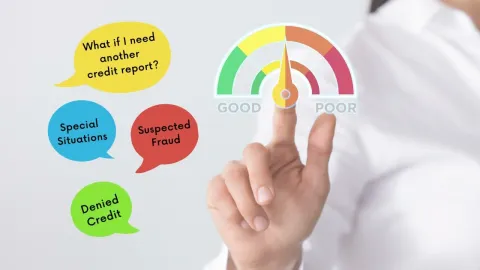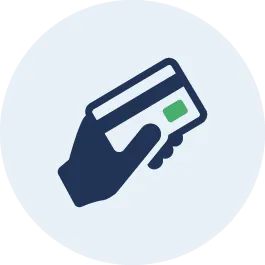Credit Reports & Credit History
A credit report is a record of your credit history that includes information about your existing credit, public records, such as court judgments or tax liens, and inquiries about you. Your name, address, full or partial Social Security number, date of birth, and possibly employment information, are commonly included. Current and fully paid or closed credit obligations will be listed, such as credit card accounts, mortgages, car loans, and student loans. It may also include the terms of your credit, how much you owe your creditors, and your history of making payments.
Credit reporting agencies sell the information in your report to lenders, employers, financial companies, and other businesses that use it to evaluate your applications for credit, insurance, employment, or renting or buying a home. A list of who recently requested a copy of your report will also be reflected on the report.
Benefits of Checking Your Credit Report
By reviewing your credit report, you will have a better understanding about what it says and what is included. It’s also an opportunity to identify, question, and dispute any errors that may appear on your report. These actions will help you maintain and potentially increase your score and overall report.

How to Get Your Credit Report
Under the Fair Credit Reporting Act (FRCA) consumers are entitled to one free credit report per year from each of the three major credit reporting agencies – Equifax, Experian, and TransUnion. In September 2023, these credit reporting agencies agreed to offer free credit reports weekly instead of once per year to encourage consumers to regularly check their credit data and build and protect their financial health. To get a free credit report, visit AnnualCreditReport.com or call 877-322-8228.

How Do You Dispute an Error on Your Credit Report?
It is important to regularly check credit reports for accuracy and to address any errors or discrepancies to avoid negative impacts on borrowing opportunities. Errors can be common on at least one of the three credit reports. These errors can negatively impact their credit scores, which may affect their ability to secure loans, credit cards, apartments, and even employment. If an error is found on a credit report, under the Fair Credit Reporting Act (FCRA), you have the right to dispute it by following the specific credit reporting agency’s dispute instructions. Check your credit reports annually to ensure the information is accurate and up to date.
Equifax

Handle dispute with Equifax by phone at 1-888-378-4329 or with the link.
Experian

Handle dispute with Experian by phone at 1-866-200-6020 or with the link.
TransUnion

Handle dispute with TransUnion by phone at 1-800-916-8800 or with the link.
What is Credit History?
How and when you’ve managed the paying off debts, such as credit cards and loans makes up your credit history. This history is recorded in your credit reports, which is why it’s important to know and understand your credit history.

What if I Have No Credit History?
More than 45 million consumers are considered to be either credit unserved or underserved in the United States, according to a 2022 global TransUnion study. If you are a young adult or need to start building a credit history or rebuild after not having credit for a long time, the following ways can help.
Select Tab
Get a Secured Credit Card
A secured credit card requires a cash deposit as collateral for the credit limit and is a good option for those with little or no credit history.

Apply for a Store Credit Card
Many gas stations and retail chains offer credit cards that can only be used in their stores and online channels. It can be easier and faster to get approved for this type of credit card.

Add a Co-Signer to a Loan Application
A co-signer is someone with a credit history who provides their financial information and signs another person’s loan application by pledging to repay the loan if it goes unpaid.

Become an Authorized User
A credit card holder can add a family member or trusted person to their account as an authorized user so that they can start building a positive credit history if the payments are made on time.

Place a Security Freeze on Your Credit Report
If you have concerns and wish to add extra protection against fraud, consider placing an extended fraud alert or credit freeze to your credit report. While an extended fraud alert makes it harder for scammers to open new accounts for seven years, a credit freeze limits access to your credit report for both you and others and lasts indefinitely unless you lift or remove it.
Fair Credit Reporting Act
The federal Fair Credit Reporting Act promotes the accuracy and privacy of information in the files of the nation’s credit reporting agencies. It also allows you to dispute information on your credit report.
Frequently Asked Questions
How do I dispute inaccurate information on my consumer report?
You can initiate a dispute by searching for the contact details of one of the three major consumer reporting agencies: TransUnion, Equifax, or Experian, or by directly contacting your credit union. To file a direct dispute with your credit union, you need to send a formal notice to the address provided by the credit union on your consumer report, or an address specifically indicated for dispute submissions. If no such address is available, you may send your notice to any business address associated with the credit union. Your dispute notice should include specific information, such as enough details to identify the account or relationship in question, the exact information you are disputing, and your reasons for the dispute. Additionally, consumers must include any supporting documentation or relevant information requested by the furnisher to substantiate their dispute. This may include items like a copy of the relevant section of the consumer report that contains the disputed information, a police report, a fraud or identity theft affidavit, a court order, or account statements.
I never gave the credit union authorization to pull my credit when I applied for a loan, and they reported information to a consumer reporting agency without my consent?
A consumer report can be requested by a credit union when you seek to obtain a loan, which includes credit for making a purchase. In this scenario, the credit union has a legitimate purpose for seeking the report and does not require specific authorization, regardless of how the credit application is submitted—whether in person, by phone, by mail, or online. Importantly, the fact that credit is ultimately not granted does not make the request for a credit report improper. The credit union does not violate your privacy by obtaining your consumer report when you seek a loan nor are they required to obtain your permission when they report information about your payment performance to a consumer reporting agency.
How can I prevent the credit union from sharing my personal information with consumer credit reporting agencies?
The credit union can report your personal information to the consumer reporting agencies in accordance with Regulation P, which allows the credit union to report information about you to a consumer reporting agency. Also, under Regulation P, you have no right to opt out of having the credit union report your personal information to the credit reporting agencies. Regulation P does not apply when a credit union discloses nonpublic personal information to a consumer reporting agency in accordance with the Fair Credit Reporting Act.
How is my FICO credit score calculated and how can I improve it?
It is important to note that the credit union does not calculate your credit score, but the national consumer reporting agencies use proprietary software to determine how the score is calculated using a scoring model. FICO is just one of many scoring models. FICO has identified the following categories and weights of each factors used to generate FICO scores:
- Payment History (35%);
- Amounts Owed (30%);
- Length of Credit History (15%);
- New Credit (10%); and
- Types of Credit in Use (10%).
What does it mean when a lender tells me that my credit utilization is high?
When a lender tells you that your credit utilization is high, that means you are using a large percentage of your available credit. This can have a significant negative impact on your credit score. Being aware of this can help you make more cautious financial decisions. Credit utilization is a critical factor in determining your credit score. Lenders might be less willing to extend new credit to you, or they may offer less favorable terms, such as higher interest rates.
What type of accounts are not included in my credit utilization ratio?
Installment loans (mortgages, auto loans, student loans and personal loans) are not included in the credit utilization ratio. These loans are repaid over a fixed period with set monthly payments. They affect your credit score through your payment history and the overall amount of debt you carry, but they are not part of the utilization calculation.
What types of accounts are included in my credit utilization ratio?
Your credit utilization ratio includes only revolving credit accounts. Examples of these accounts are credit cards, personal lines of credit, and home equity lines of credits (HELOCs).
How is my credit utilization calculated?
Your credit utilization is calculated by comparing the amount of credit you’re using to your available credit. Here’s how you can calculate it.
- Add Up Your Balances – Sum the balances on all your credit cards.
- Add Up Your Credit Limits – Sum the credit limits on all your credit cards.
- Divide and Multiply – Divide the total balance by the total credit limit, then multiply by 100 to get a percentage.
For Example: If you have a total balance of $2,000 and a total credit limit of $10,000, your credit utilization ratio would be 20%. If you have a total balance of $3,500 and a total credit limit of $10,000, your credit utilization ratio would be 35%. Using below 30% of your available credit or your credit limits is suggested because using less is better for your score.
What is the difference between FICO and a credit score?
A FICO score is a type of credit score created by a specific algorithm used by the Fair Isaac Corporation (FICO). It’s one of the most widely used credit scoring models by lenders to assess risk. A credit score is a numerical representation of your creditworthiness, which is a measure of how likely you are to repay a loan. It’s based on your credit history and helps lenders assess the risk of lending you money. Lenders may use different types of credit scores depending on their preferences, the industry, and the specific type of credit or loan you are applying for.
What is a hard inquiry?
A hard inquiry means that someone has requested to look at your credit report to determine your creditworthiness. Hard inquiries typically occur when you apply, for instance, for a new credit card, car loan or mortgage. Hard inquires will show up on your credit report and may stay there for two years. Additionally, hard inquiries may lower your credit score.
Credit Scores and Credit Reports
Your credit score affects whether you can get a loan or credit card, as well as what interest rate and other terms you’ll get. It can also affect whether you can rent a home, get a job, or get insurance. Your credit score is a number that is based on information from your credit report. Your credit report, is a record of whether you pay your bills on time, what debt you have, where you’ve lived, whether you’ve been sued or arrested, and other information. Creditors report your payment and debt information to credit reporting companies, which then put together credit reports that other creditors can look at when deciding whether to give you credit. There are three major credit reporting companies in the United States: Equifax, Experian, and TransUnion.
Because your credit score is based on your credit reports, it is important to check your credit reports regularly, tell the credit reporting companies if any information is wrong, and fix your credit if necessary. Read on to find out how to:
- Check your credit report
- Dispute errors on your credit report
- Fix your credit and improve your credit score
Check Your Credit Report
Because your credit score is so important in getting loans, credit, and housing, it’s important to check your credit reports regularly to make sure they are correct and complete. Checking your credit reports will also alert you to identity fraud because you’ll see if someone has opened accounts in your name or if late payments have been reported for purchases you didn’t know about.
You can get one free copy of your credit report every 12 months from each of the three major credit reporting companies (Equifax, Experian, and TransUnion). All three credit reporting companies collect credit information, but different things may show up on the different credit reports. You can monitor your credit for free by getting free copies of your credit report. There are two common ways to do this:
- You can get one credit report from one company, then wait four months and get a report from another company, then wait four months and get a report from the third company. Then, start over again. This way, you can find out more quickly if something is wrong; or
- You can get credit reports from all three companies at the same time, once a year. You can then check the reports against each other to make sure nothing is wrong.
In addition, you can get a free copy of your credit report:
- If a company denies your application for credit, insurance, or employment and you request the report within 60 days;
- Once a year, if you are unemployed and plan to look for a job within 60 days;
- Once a year, if you are on public assistance; or
- Once a year, if your credit report is incorrect because you’ve been a victim of identity theft or other fraud.
To order a free credit report, go to Annual Credit Report or call 1-877-322-8228.
Annual Credit Report is the only authorized source for free credit reports. Other companies and websites may offer “free” credit reports or credit scores, but often they charge hidden fees, try to sell you something, or collect your personal information to sell. While Annual Credit Report requires you to give certain personal information to request your free credit report, it will not call or email you to ask for personal information. If you get such a call or email, it is probably a scam.
For more information on checking your credit report, visit the Federal Trade Commission’s Free Credit Reports and the CFPB ‘s Getting A Credit Report.
Dispute Errors on Your Credit Report
If your credit report has wrong information, you can dispute the error so that it is fixed. Here is how to dispute an error:
First, write a letter to the credit reporting companies (Equifax, Experian, and TransUnion) that have the wrong information to ask them to fix the information. Include all of the following:
- Your name and address;
- The specific information in your credit report that is wrong;
- Why that information is wrong;
- Copies (not originals) of any receipts, emails, or other documents that support why the information is wrong; and
- Ask that the information be deleted or corrected.
You may use the Federal Trade Commission’s sample dispute letter to credit reporting companies and attach a copy of your credit report with the wrong items circled. Send the letter by certified mail or priority with tracking, and keep a copy of the letter and receipt. You may also submit your letter of dispute and supporting documentation online by going to the websites of the three major credit reporting agencies (Equifax, Experian, and TransUnion). While you may submit your letter of dispute online through the three major credit reporting agencies, they may use this as an opportunity to try to sell you services that you do not need to purchase in order to correct your credit report. You do not need to purchase these services.
Second, write a letter to the information provider that gave the wrong information to the credit reporting companies. This might be a store that incorrectly billed you for something, a landlord that incorrectly said you were late on your rent, or some other person or company. If the information provider’s address is not listed on your credit report, contact the information provider for the address for submitting disputes or notices of error. Include the same information as in your letter to the credit reporting agencies. You may use the Federal Trade Commission’s sample dispute letter to information providers and attach a copy of your credit report with the incorrect items circled. Send the letter by certified mail or priority with tracking, and keep copies for yourself.
Credit reporting companies must investigate all disputes, usually within 30 days, unless they consider your dispute frivolous. They will forward your dispute to the information provider, who will then investigate your dispute and report back to the credit reporting company. If the information provider determines that its information was wrong, it must correct that information with all three of the major credit reporting companies.
Credit reporting companies must tell you their investigation results in writing. If they delete or correct any information on your credit report, they must give you a free copy of your updated credit report. You may ask them to send a notice of the correction to anyone who got your credit report in the last six months.
If you cannot get the disputed information corrected or deleted, you may ask the credit reporting companies to add a statement noting your dispute in your file and in future credit reports.
For more information on disputing errors in your credit report, visit the Federal Trade Commission’s Disputing Errors on Credit Reports and the CFPB ‘s Disputing Errors On A Credit Report.
Fix Your Credit and Improve Your Credit Score
Here are some tips on how to fix your credit and improve your credit score:
- Pay your bills on time. Paying off your credit card balance and paying your other bills on time will really help your credit score.
- Have some — but not too many — credit accounts. Creditors want to know your track record of paying off bills and debts. To show a good track record, open some credit accounts, pay on time, and try not to have a lot of debt. But beware: having too much credit—for example, having many credit cards—may hurt your credit score because creditors may look at your total debt potential.
- Don’t apply for too much new credit in a short period of time. Be thoughtful about what credit cards or financing to apply for. Applying for many new credit cards or other credit accounts in a short period of time counts as several “inquiries” on your credit report and can hurt your credit score. Note that if you have lots of inquiries for a mortgage or car loan in a short period of time, many creditors will consider them as a single inquiry.
- Don’t max out your credit limits. Your credit score will likely be hurt if the amount of debt you owe is close to your credit limit. According to one rule of thumb, creditors may be hesitant to lend you money if your debts are more than 75% of your credit limit. So, make sure you know how much you owe on your credit cards and other debt. If you can, pay off your full credit card balance every month. If you can’t, try to keep a low balance and pay down as much as you can.
- Work out repayment plans. If you are having trouble paying your bills or repaying your loans, contact your creditors about repayment plans. If you arrange a repayment with a creditor, make sure—before you make any payments—that you have a written agreement from the creditor that as long as you keep up your end of the plan, the creditor will report your account as current, paid off, and not late. It is better to work out a repayment plan sooner rather than later because creditors generally won’t work with you after they send your account to a debt collection service, and that will likely hurt your credit score more.
If you need help fixing your credit, contact a non-profit credit counseling service that can help you for little or no cost. You can also check with your employer, credit union, or housing authority to see what no-cost credit counseling programs may be available.
It takes time to build up or fix your credit. Unfortunately, there are a lot of fraudsters preying on consumers who want to fix their credit. Avoid any credit counselor or company that promises quick-fix credit repairs, promises to hide your bad credit history, requires upfront payment, or tells you to dispute accurate credit report information or to give false information to creditors.
Here are some resources to help you find a reputable credit counselor:
- Federal Trade Commission’s Choosing a Credit Counselor: How to choose a credit counseling service
- Federal Trade Commission’s Fixing Your Credit FAQs
- Department of Financial Protection and Innovation’s Crediting Counseling Organizations Q&A : Common questions about credit counseling services
- Consumer Financial Protection Bureau: How to Avoid Credit Repair Scams
If you believe a consumer reporting company, creditor, or credit counselor has violated the law, you may file a complaint with the Attorney General’s Office. The Office uses complaints to learn about misconduct. However, we cannot give legal advice or provide legal assistance to individuals. For information on how to find an attorney, see Attorneys/Lawyers.
You may also file a complaint with the Federal Trade Commission online or by calling 1-877-FTC-HELP.
For more information about credit scores and credit reports, visit the Federal Trade Commission’s Credit Scores and the CFPB ‘s Credit Reports And Scores.
https://mycreditunion.gov/manage-your-money/credit/credit-reports-credit-historyhttps://www.oag.ca.gov/consumers/general/credit-scores-credit-reports
